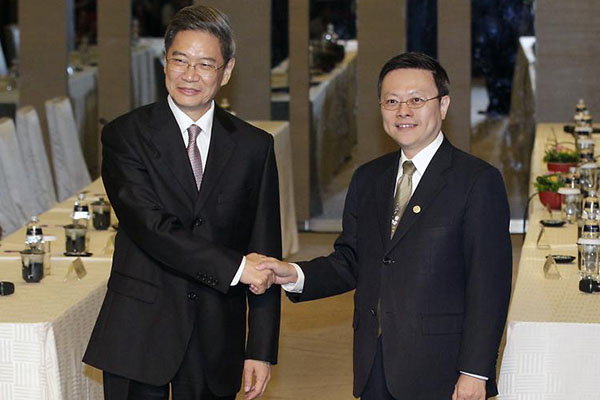
China’s Zhang Zhijun Visits Taiwan to Discuss Trade Pact and Improve Relations

Basseterre, St Kitts – Zhang Zhijun, a senior Chinese official in charge of handling relationships with Taiwan, reached Taipei on Wednesday for a four-day trip that includes meetings with ministers to improve bilateral ties, following protests in the prosperous southeast Asian nation against its neighbor and the region’s fastest-growing economy, earlier this year.
Zhang reached Taoyuan in the north and met Wang Yu-chi, Taiwan’s Mainland Affairs minister, for the second time this year, along with mayors of three other cities, mainly to discuss a controversial trade pact, which has stalled in Taiwanese courts, and to boost mutual investments, Associated Press reported. The visit is the first of its kind by a ministerial official from China and has already triggered minor protests in Taiwan from groups that believe that China will attempt to assert more control over Taiwan if the trade pact is signed.
“We expect at least a dozen separate groups will come out to protest in Kaohsiung,” Shinichi Chen, general secretary of the pro-independence South Taiwan Society, said, according to Reuters adding: “Our demands are very simple: we want Zhang to acknowledge that Taiwan is a nation that belongs to the Taiwanese, and that Taiwan’s future will be decided by the Taiwanese.”
Relations between China and Taiwan have been prickly since a civil war in the 1940s led to Taiwan being governed separately. But, since President Ma Ying-jeou’s rule began in 2008, relations between the countries have improved drastically though China considers Taiwan a part of its territory and has not eliminated the possibility of forcibly taking over the region.
“The difference between Hong Kong and Taiwan is night and day,” Bruce Jacobs, a Taiwan expert at Australia’s Monash University said, according to Reuters, adding: “Taiwan has its own army and 150 km (93 miles) of sea separating it from the mainland. The divisions between Taiwan and China run really deep and would clearly get in the way of any potential political agreement between the two.”
In March, Taiwanese protesters had gathered outside parliament to protest against the China-Taiwan trade pact, which was signed a year back, but is still not implemented. The Taiwanese government, led by Ma who has an affinity toward China, believes that the pact will bring more jobs to the region and will foster economic development in Taiwan.
Lawmakers are set to discuss the trade pact in a session that will continue during Zhang’s visit while he conducts meetings with local minority groups and business people, Xinhua reported.
“This will be an opportunity for Taiwan’s opposition and people who don’t like the mainland to get to know Zhang Zhijun, to listen to him and understand that China wants to help, not harm, Taiwan’s economy,” Zheng Zhenqing, an assistant professor at Tsinghua University’s Institute of Taiwan Studies in Beijing, said, according to Reuters.
